What is the output of the following program include include
What is the output of the following program?
#include <cstdint>
#include <stdio.h>
int main()
{
int8_t n = -3;
printf(\"%d\", (int16_t) n);
}
Answer:
Question 2
Not yet answered
Points out of 1.00
Flag question
Question text
What is the output of the following program?
#include <cstdint>
#include <stdio.h>
int main()
{
int8_t n = -3;
printf(\"%d\", (int32_t) n);
}
Answer:
Question 3
Not yet answered
Points out of 1.00
Flag question
Question text
What is the output of the following program?
#include <cstdint>
#include <stdio.h>
int main()
{
int8_t n = -3;
printf(\"%lld\", (int64_t) n);
}
Answer:
Question 4
Not yet answered
Points out of 1.00
Flag question
Question text
What is the output of the following program?
#include <cstdint>
#include <stdio.h>
int main()
{
int8_t n = -3;
printf(\"%x\", (int32_t) n);
}
Answer:
Question 5
Not yet answered
Points out of 1.00
Flag question
Question text
What is the output of the following program?
#include <cstdint>
#include <stdio.h>
int main()
{
uint8_t n = 3;
printf(\"%d\", (int32_t) n);
}
Answer:
Question 6
Not yet answered
Points out of 1.00
Flag question
Question text
What is the output of the following program?
#include <cstdint>
#include <stdio.h>
int main()
{
uint8_t n = 0xff;
printf(\"%d\", (int32_t) n);
}
Answer:
Question 7
Not yet answered
Points out of 1.00
Flag question
Question text
What is the output of the following program?
#include <cstdint>
#include <stdio.h>
int main()
{
uint8_t n = 0xff;
printf(\"%d\", (int32_t) (int8_t) n);
}
Answer:
Question 8
Not yet answered
Points out of 1.00
Flag question
Question text
In the code segment below, assume that x is an int and x is less than 0
if ((x * 2) < 0) printf(\"howdy\"); else printf(\"goodbye\");
What is the output?
Select one:
a. could be either howdy or goodbye depending upon the value of x
b. will always be goodbye
c. will always be howdy
Question 9
Not yet answered
Points out of 1.00
Flag question
Question text
In the code segment below, assume that ux is an unsigned int.
if (ux >= 0) printf(\"howdy\"); else printf(\"goodbye\");
What is the output?
Select one:
a. will always be goodbye
b. could be either howdy or goodbye depending upon the value of x
c. will always be howdy
Question 10
Not yet answered
Points out of 1.00
Flag question
Question text
In the code segment below, assume that ux is an unsigned int.
if (ux > -1) printf(\"howdy\"); else printf(\"goodbye\");
What is the output?
Select one:
a. could be either howdy or goodbye depending upon the value of ux
b. will always be howdy
c. will always be goodbye
Question 11
Not yet answered
Points out of 1.00
Flag question
Question text
In the code segment below, assume that x and y are ints and x is greater than y
if (-x < -y) printf(\"howdy\"); else printf(\"goodbye\");
What is the output?
Select one:
a. will always be goodbye
b. could be either howdy or goodbye depending upon the value of x
c. will always be howdy
Question 12
Not yet answered
Points out of 1.00
Flag question
Question text
In the code segment below, assume that x is an int.
if (((x >> 1) << 1) == x) printf(\"howdy\"); else printf(\"goodbye\");
What is the output?
Select one:
a. could be either howdy or goodbye depending upon the value of x
b. will always be goodbye
c. will always be howdy
Question 13
Not yet answered
Points out of 1.00
Flag question
Question text
In the code segment below, assume that x is an int.
if (((x >> 1) << 1) <= x) printf(\"howdy\"); else printf(\"goodbye\");
What is the output?
Select one:
a. could be either howdy or goodbye depending upon the value of x
b. will always be goodbye
c. will always be howdy
Question 14
Not yet answered
Points out of 1.00
Flag question
Question text
In the code segment below, assume that x and y are ints and ux and uy are unsigned ints.
ux = x;
uy = y;
if ((x + y) == (ux + uy)) printf(\"howdy\ \"); else printf(\"goodbye\ \");
For these statements, the output will:
Select one:
a. could be either howdy or goodbye depending upon the value of x
b. will always be goodbye
c. will always be howdy
Question 15
Not yet answered
Points out of 1.00
Flag question
Question text
What is the output of the following C code?
#include <cstdint>
#include <stdio.h>
int main()
{
int32_t in = -1;
uint32_t un;
un = in;
in = un;
printf(\"%d\", in);
}
Answer:
Question 16
Not yet answered
Points out of 1.00
Flag question
Question text
What is the output of the following C code?
unsigned int ux = -3;
unsigned int x = 3;
if (x > ux) printf(\"howdy\"); else printf(\"goodbye\");
Answer:
Question 17
Not yet answered
Points out of 1.00
Flag question
Question text
What is the output of the following C code?
#include <cstdint>
#include <stdio.h>
int main()
{
int32_t in = -1;
uint32_t un = 3;
if (in < un)
printf(\"%d\", in);
else
printf(\"%d\", un);
}
Answer:
Solution
Question 1
#include <cstdint>
#include <stdio.h>
int main()
{
int8_t n = -3;
printf(\"%d\", (int16_t) n);
}
Answer: -3
Question 2
#include <cstdint>
#include <stdio.h>
int main()
{
int8_t n = -3;
printf(\"%d\", (int32_t) n);
}
Answer: -3
Question 3
#include <cstdint>
#include <stdio.h>
int main()
{
int8_t n = -3;
printf(\"%lld\", (int64_t) n);
}
Answer: -3
Question 4
#include <cstdint>
#include <stdio.h>
int main()
{
int8_t n = -3;
printf(\"%x\", (int32_t) n);
}
Answer: fffffffd
Question 5
#include <cstdint>
#include <stdio.h>
int main()
{
uint8_t n = 3;
printf(\"%d\", (int32_t) n);
}
Answer: 3
Question 6
#include <cstdint>
#include <stdio.h>
int main()
{
uint8_t n = 0xff;
printf(\"%d\", (int32_t) n);
}
Answer: 255
Question 7
#include <cstdint>
#include <stdio.h>
int main()
{
uint8_t n = 0xff;
printf(\"%d\", (int32_t) (int8_t) n);
}
Answer: -1
Question 8
In the code segment below, assume that x is an int and x is less than 0
if ((x * 2) < 0) printf(\"howdy\"); else printf(\"goodbye\");
What is the output?
Answer
c. will always be howdy
Question 9
In the code segment below, assume that ux is an unsigned int.
if (ux >= 0) printf(\"howdy\"); else printf(\"goodbye\");
What is the output?
Select one:
Answer:
c. will always be howdy
Question 10
In the code segment below, assume that ux is an unsigned int.
if (ux > -1) printf(\"howdy\"); else printf(\"goodbye\");
What is the output?
Answer:
c. will always be goodbye
Question 11
In the code segment below, assume that x and y are ints and x is greater than y
if (-x < -y) printf(\"howdy\"); else printf(\"goodbye\");
What is the output?
Answer:
c. will always be howdy
Question 12
In the code segment below, assume that x is an int.
if (((x >> 1) << 1) == x) printf(\"howdy\"); else printf(\"goodbye\");
What is the output?
Answer :
b. will always be goodbye
Question 13
In the code segment below, assume that x is an int.
if (((x >> 1) << 1) <= x) printf(\"howdy\"); else printf(\"goodbye\");
What is the output?
Answer:
c. will always be howdy
Question 14
In the code segment below, assume that x and y are ints and ux and uy are unsigned ints.
ux = x;
uy = y;
if ((x + y) == (ux + uy)) printf(\"howdy\ \"); else printf(\"goodbye\ \");
For these statements, the output will:
Answer:
c. will always be howdy
Question 15
What is the output of the following C code?
#include <cstdint>
#include <stdio.h>
int main()
{
int32_t in = -1;
uint32_t un;
un = in;
in = un;
printf(\"%d\", in);
}
Answer: -1
Question 16
unsigned int ux = -3;
unsigned int x = 3;
if (x > ux) printf(\"howdy\"); else printf(\"goodbye\");
Answer: goodbye
Question 17
What is the output of the following C code?
#include <cstdint>
#include <stdio.h>
int main()
{
int32_t in = -1;
uint32_t un = 3;
if (in < un)
printf(\"%d\", in);
else
printf(\"%d\", un);
}
Answer: 3
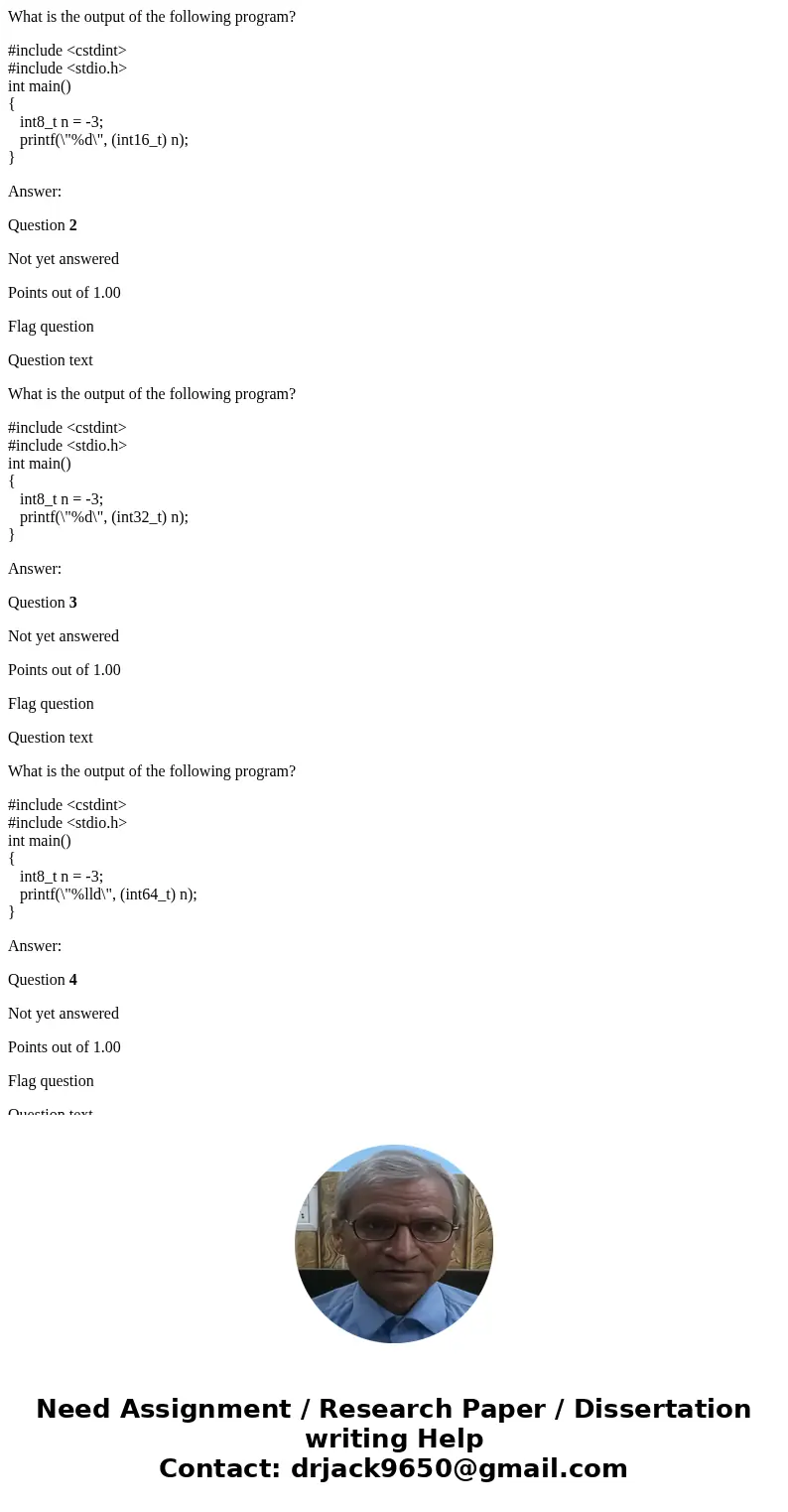
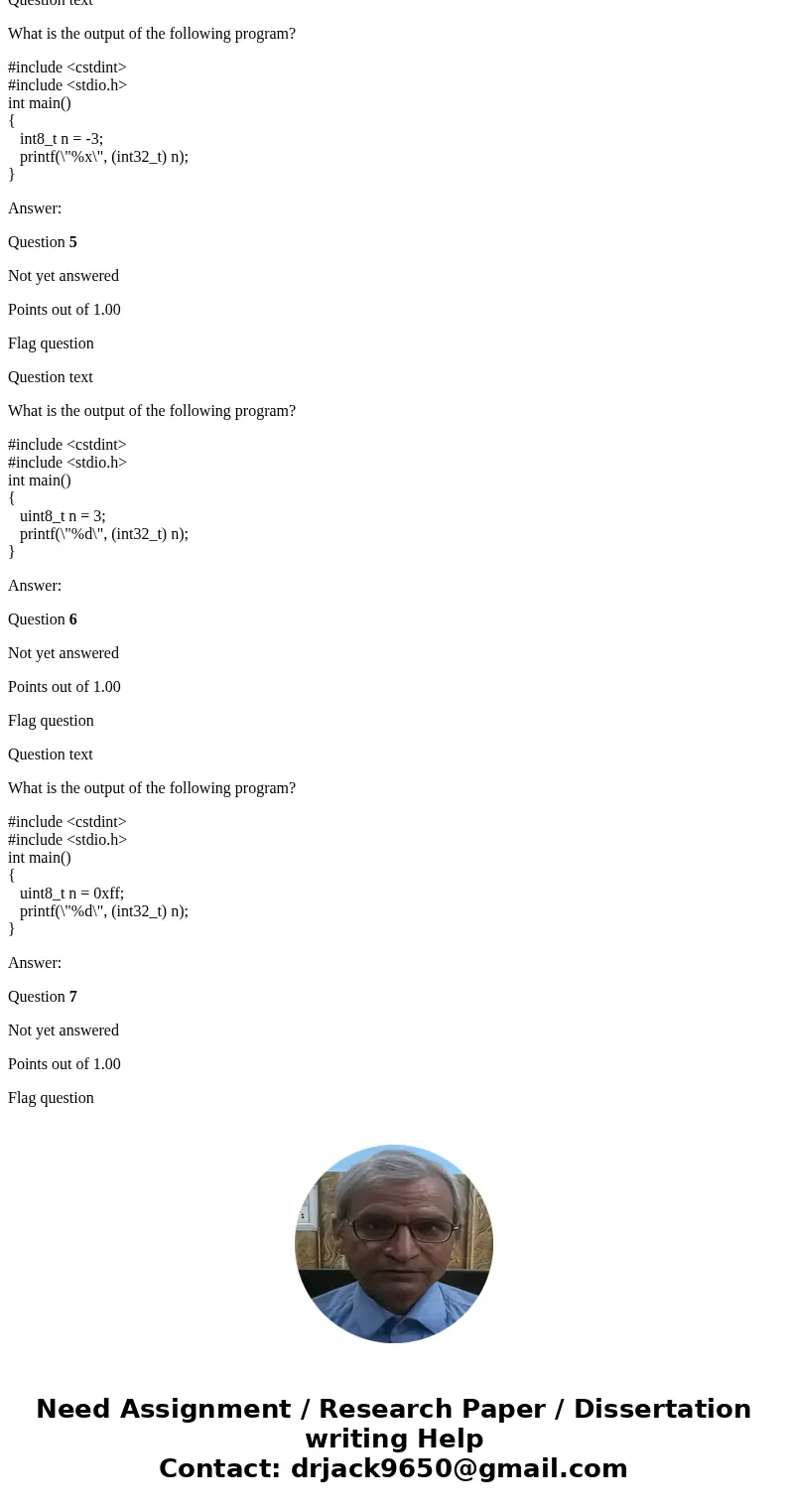
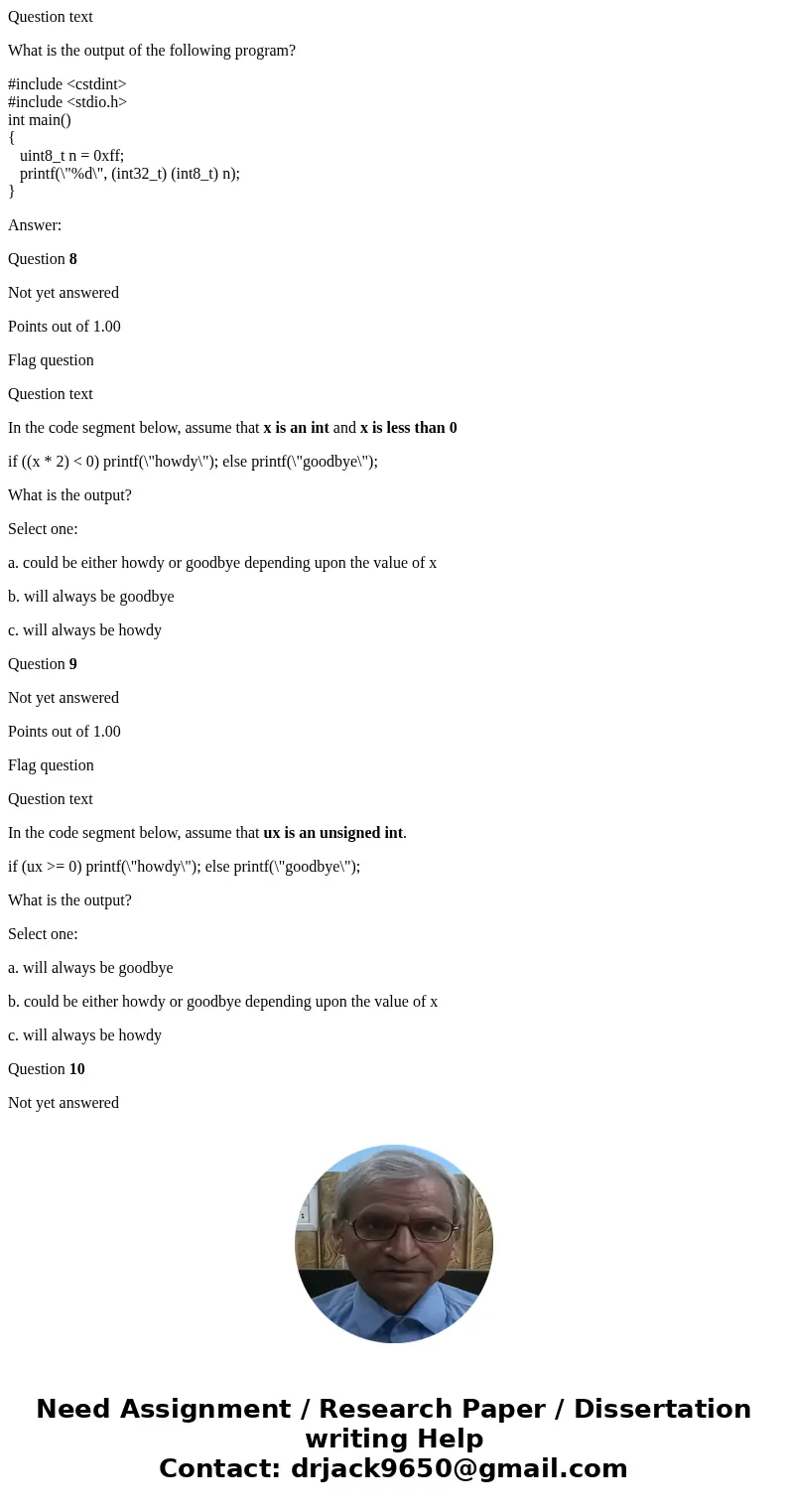
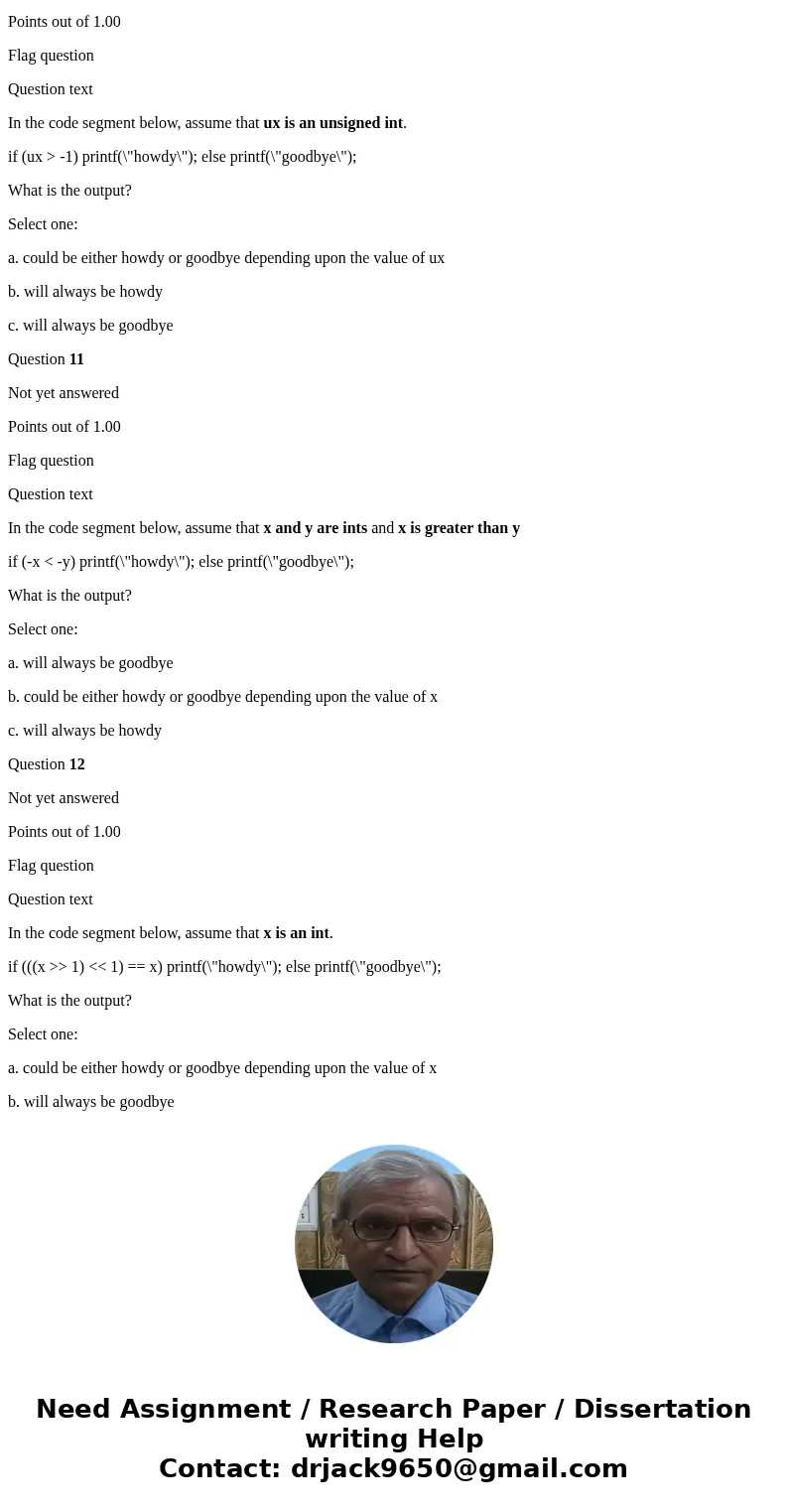
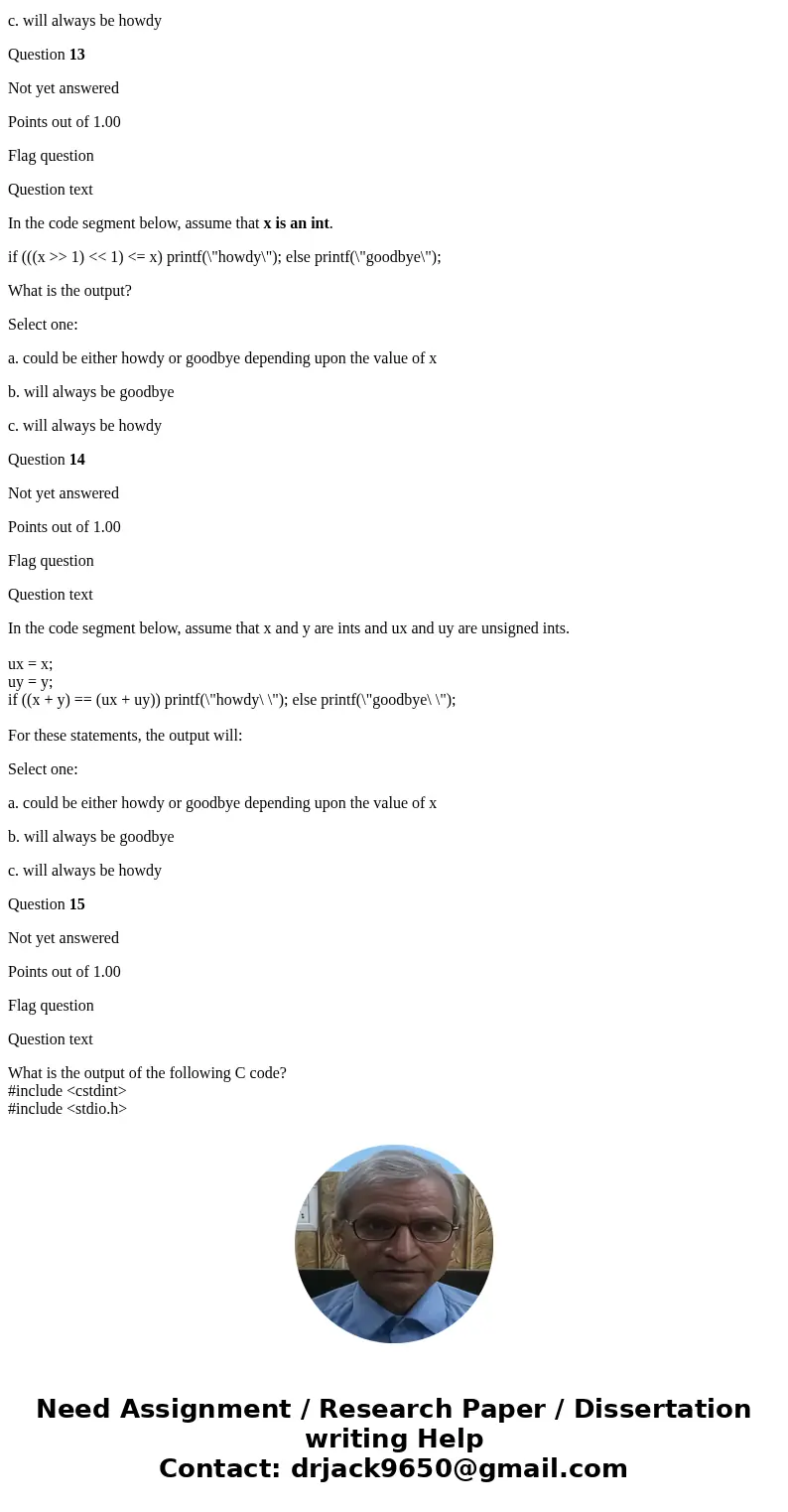
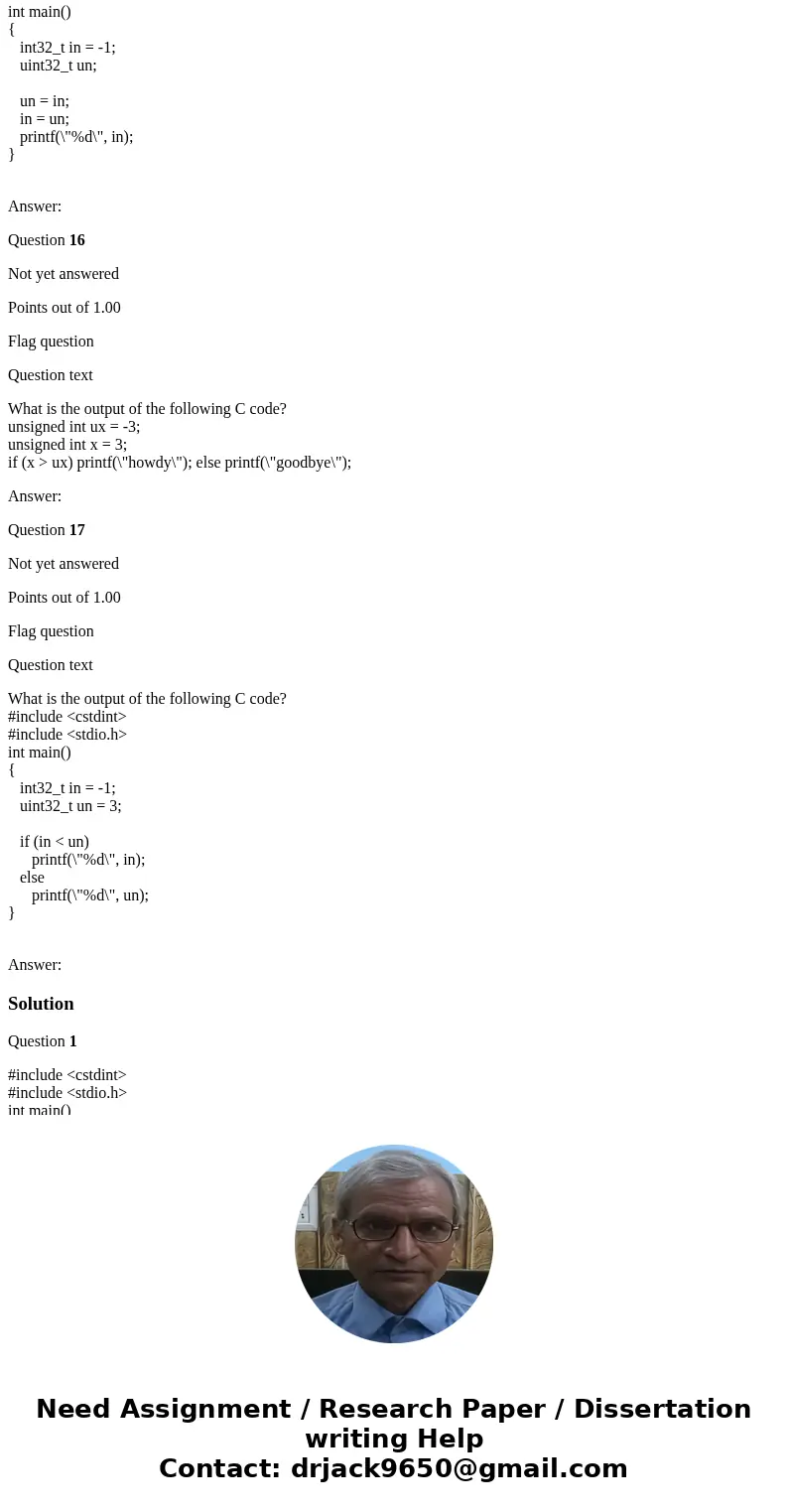
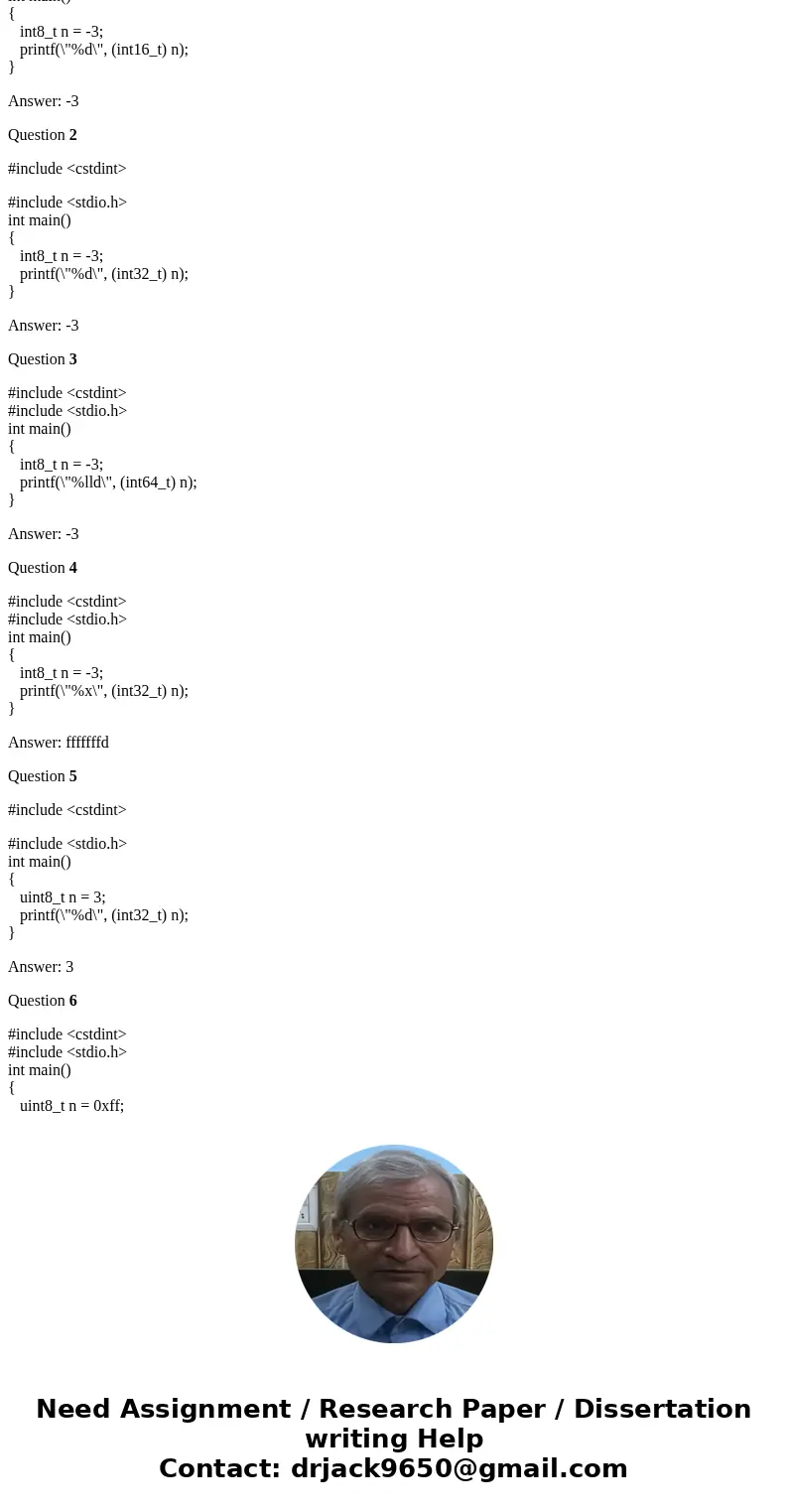
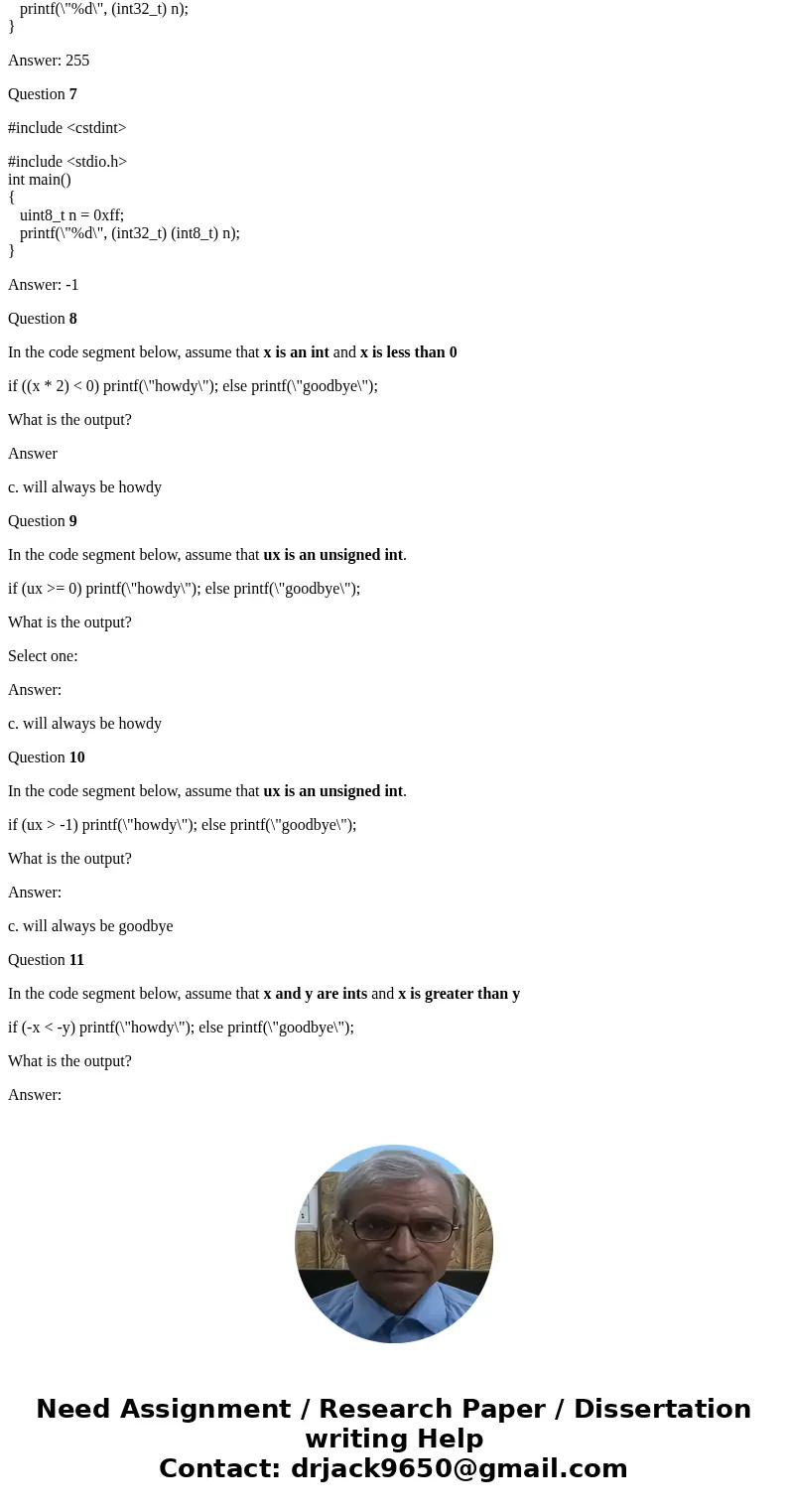
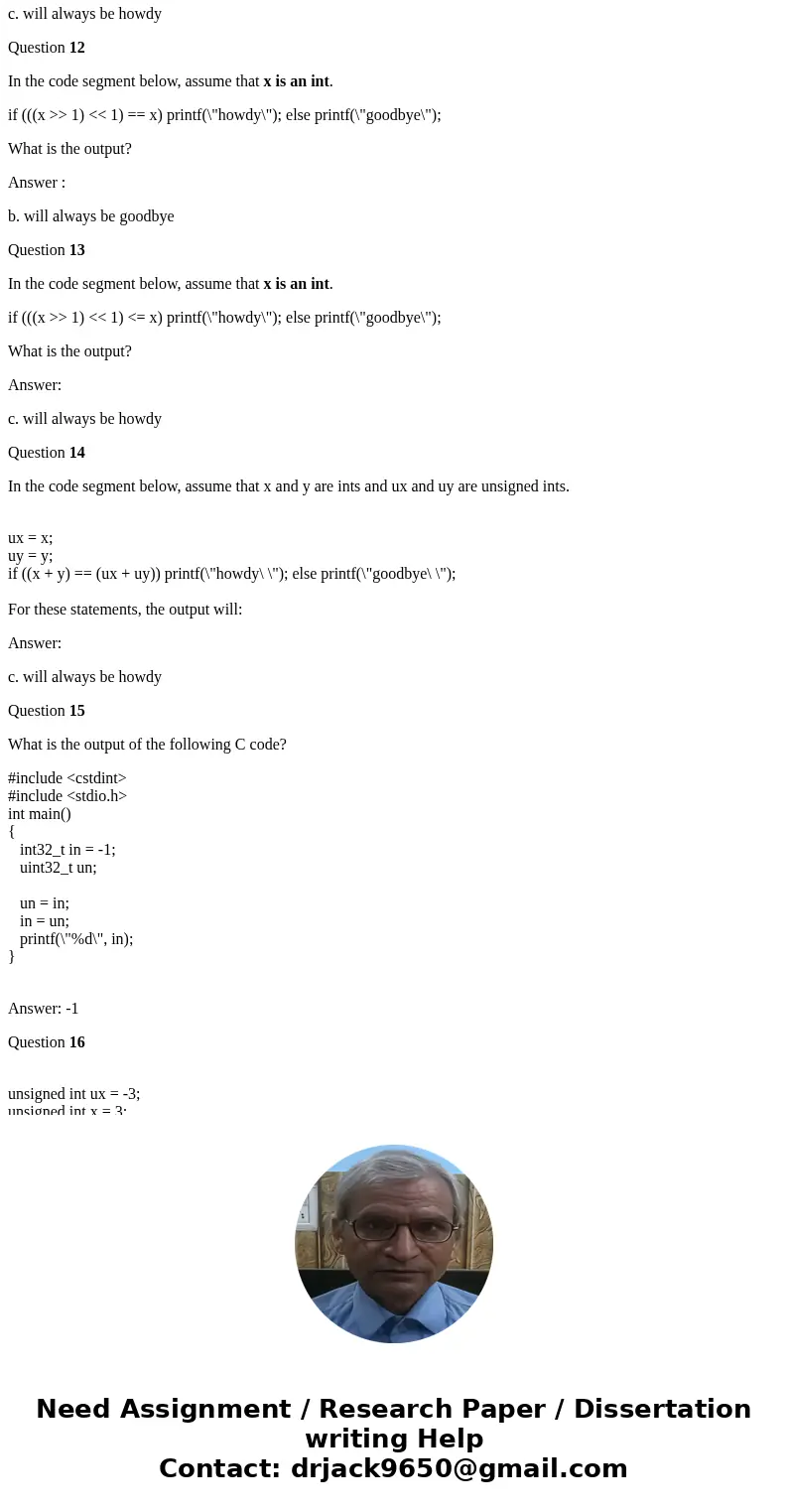
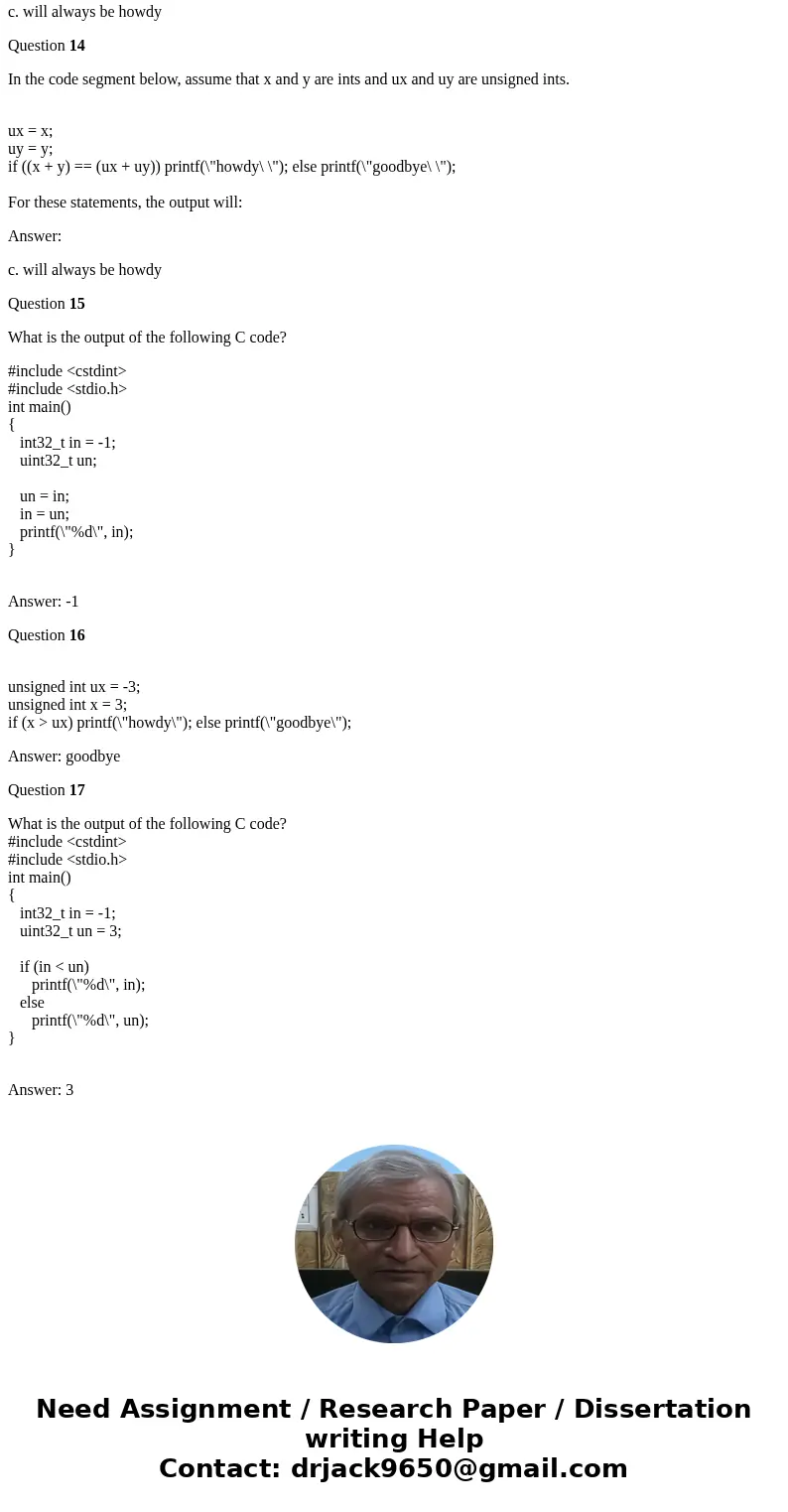
 Homework Sourse
Homework Sourse